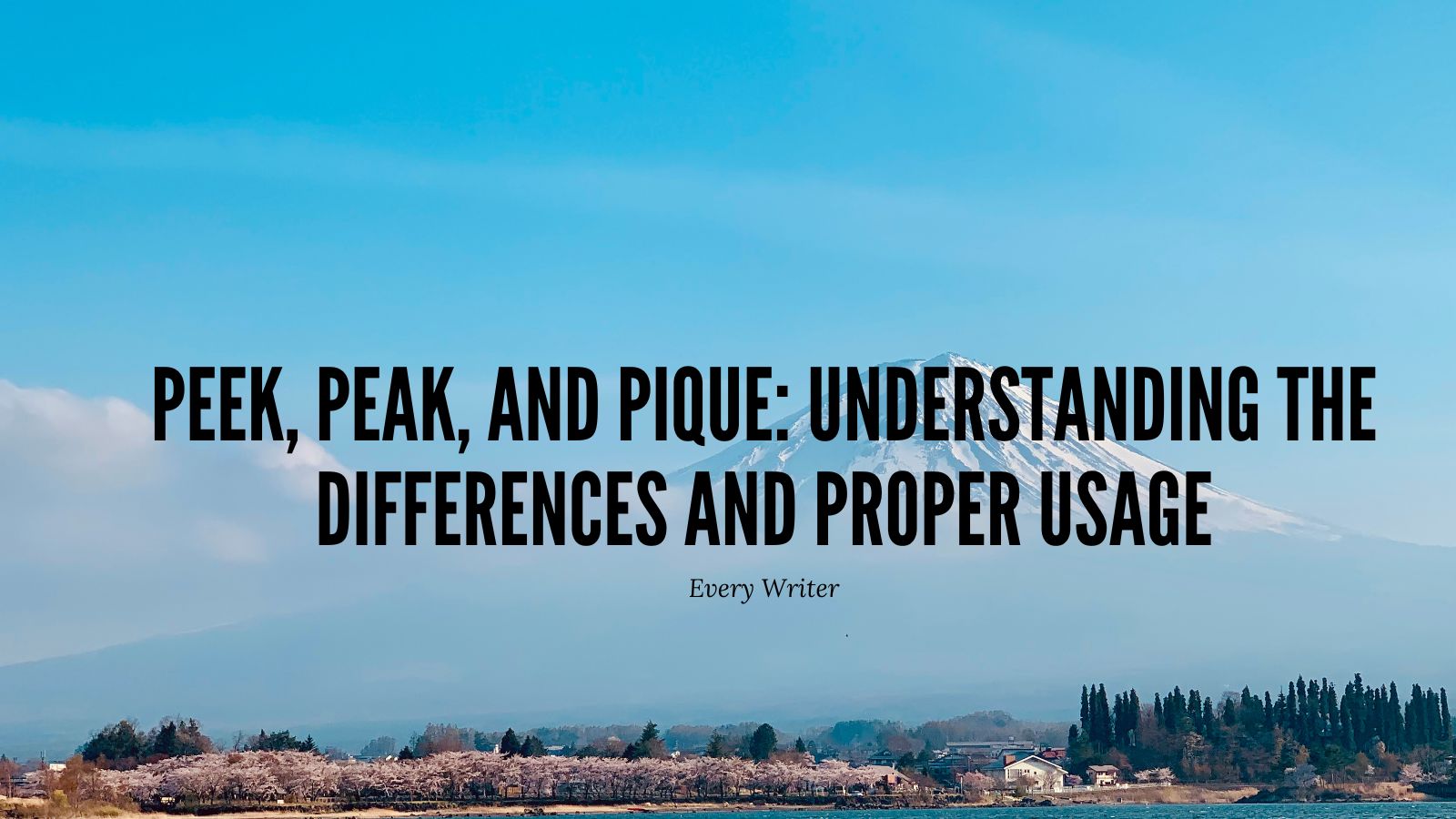
Peek, Peak, and Pique: Understanding the Differences and Proper Usage: In the English language, there are many words that sound similar but have entirely different meanings. Three such words that often confuse writers are “peek,” “peak,” and “pique.” In this article, we’ll explore the differences between these homophones and provide examples of how to use them correctly in your writing.
Peek: A Quick Glance or a Secret Look The word “peek” is a verb that means to take a quick, furtive look at something or someone. It can also be used as a noun to describe such a glance. When you peek at something, you are essentially stealing a glance without being noticed.
Examples:
- She peeked through the curtains to see who was knocking at the door.
- The child took a quick peek at his birthday presents when his parents weren’t looking.
Peak: The Highest Point or Maximum Level “Peak” is a noun that refers to the highest point of a mountain or the maximum level of something. It can also be used as a verb to describe reaching the highest point or level.
Examples:
- The hikers finally reached the peak of the mountain after a grueling climb.
- The company’s sales peaked during the holiday season.
Pique: To Stimulate or Arouse Interest or Curiosity “Pique” is a verb that means to stimulate or arouse interest, curiosity, or anger in someone. It can also be used as a noun to describe a feeling of irritation or resentment.
Examples:
- The mysterious headline piqued her curiosity, and she clicked on the article to learn more.
- His condescending tone piqued her anger, and she struggled to remain calm.
Common Mistakes and How to Avoid Them One of the most common mistakes writers make is using “peak” when they mean “pique.” Remember, “peak” refers to the highest point, while “pique” means to stimulate interest or curiosity.
Incorrect: The strange noise peaked my interest, and I went to investigate. Correct: The strange noise piqued my interest, and I went to investigate.
Another mistake is using “peek” when “peak” is intended.
Incorrect: The mountain peek was covered in snow. Correct: The mountain peak was covered in snow.
To avoid these mistakes, take a moment to consider the meaning of the sentence and choose the appropriate word. If you’re describing a quick glance or secret look, use “peek.” If you’re referring to the highest point or maximum level, use “peak.” And if you want to describe stimulating interest or curiosity, use “pique.”
Conclusion By understanding the differences between “peek,” “peak,” and “pique,” you can ensure that your writing is clear, precise, and error-free. Remember to peek when you want to take a quick look, reach the peak when you’re at the highest point, and pique someone’s interest when you want to stimulate their curiosity. With practice and attention to detail, you’ll master these homophones in no time!
Etymology of Peek, Peak, Pique
Etymology is a fascinating aspect of language that uncovers the historical origins and evolution of words. In this section, we’ll delve into the etymologies of three commonly confused words: “peek,” “peak,” and “pique.” By understanding the roots and original meanings of these words, we can better appreciate their current usages and the ways in which language evolves over time. Let’s explore the intriguing origins of these terms, from their Germanic and Romance language roots to their modern-day meanings.
Peek: The word “peek” originated from the Middle English word “piken,” which meant “to peep or look quickly.” It is believed to have derived from the Dutch word “pieken,” meaning “to peek or pry.” The word “peek” has been in use since the late 14th century and has maintained its meaning of taking a quick, furtive look at something.
Peak: “Peak” comes from the Old English word “peac,” which meant “a pointed top or projection.” This word is believed to have originated from the Proto-Germanic “*pīkaz,” meaning “a sharp point or spike.” The term “peak” has been used to describe the highest point of a mountain or the maximum level of something since the early 16th century.
Pique: The word “pique” has a more complex etymology. It originated from the French word “piquer,” which meant “to prick, sting, or irritate.” This French word is derived from the Old French “pic,” meaning “a sharp point or prick,” which itself comes from the Latin word “picus,” meaning “woodpecker.” The connection between “picus” and “piquer” is thought to be due to the bird’s sharp beak and its ability to peck at wood. The figurative use of “pique” to mean “to stimulate or arouse interest or curiosity” emerged in the mid-17th century.
It’s interesting to note that while “peek” and “peak” have Germanic roots, “pique” has a Romance language origin. Despite their similar pronunciations, these words have distinct etymologies and meanings that have evolved over time.
Practice
Here are 20 practice questions based on the article “Peek, Peak, and Pique: Understanding the Differences and Proper Usage”:
- Which word means to take a quick, furtive look at something or someone? a) Peek b) Peak c) Pique
- Which word refers to the highest point of a mountain or the maximum level of something? a) Peek b) Peak c) Pique
- Which word means to stimulate or arouse interest, curiosity, or anger in someone? a) Peek b) Peak c) Pique
- “The child took a quick _____ at his birthday presents when his parents weren’t looking.” a) Peek b) Peak c) Pique
- “The company’s sales _____ during the holiday season.” a) Peeked b) Peaked c) Piqued
- “The mysterious headline _____ her curiosity, and she clicked on the article to learn more.” a) Peeked b) Peaked c) Piqued
- True or False: “Peak” can be used as a verb to describe reaching the highest point or level. a) True b) False
- True or False: “Pique” can be used as a noun to describe a feeling of irritation or resentment. a) True b) False
- Which is the correct usage? a) The strange noise peaked my interest, and I went to investigate. b) The strange noise piqued my interest, and I went to investigate.
- Which is the correct usage? a) The mountain peek was covered in snow. b) The mountain peak was covered in snow.
- The word “peek” originated from which Middle English word? a) Piken b) Peac c) Piquer
- The word “peak” comes from the Old English word “peac,” which meant: a) A pointed top or projection b) To prick, sting, or irritate c) To peep or look quickly
- The word “pique” originated from which French word? a) Pic b) Piquer c) Picus
- True or False: “Peek” and “peak” have Germanic roots, while “pique” has a Romance language origin. a) True b) False
- “She _____ through the curtains to see who was knocking at the door.” a) Peeked b) Peaked c) Piqued
- “The hikers finally reached the _____ of the mountain after a grueling climb.” a) Peek b) Peak c) Pique
- “His condescending tone _____ her anger, and she struggled to remain calm.” a) Peeked b) Peaked c) Piqued
- Which word is believed to have derived from the Dutch word “pieken,” meaning “to peek or pry”? a) Peek b) Peak c) Pique
- Which word has been used to describe the highest point of a mountain or the maximum level of something since the early 16th century? a) Peek b) Peak c) Pique
- The figurative use of “pique” to mean “to stimulate or arouse interest or curiosity” emerged in which century? a) 14th century b) 16th century c) 17th century
Lesson Plan: Mastering the Homophones “Peek,” “Peak,” and “Pique”
Objective:
Students will be able to differentiate between the homophones “peek,” “peak,” and “pique,” understand their meanings and etymologies, and use them correctly in sentences.
Duration:
90 minutes
Materials:
- Whiteboard and markers
- Handouts with definitions, examples, and practice exercises
- Index cards for vocabulary game
- Computer with internet access for etymology research
Warm-up (5 minutes):
- Write the words “peek,” “peak,” and “pique” on the whiteboard.
- Ask students to share any prior knowledge or experiences with these words.
Introduction (10 minutes):
- Explain that today’s lesson will focus on understanding the differences between the homophones “peek,” “peak,” and “pique,” as well as their etymologies.
- Provide a brief overview of the lesson plan and objectives.
Direct Instruction (20 minutes):
- Present the definitions and examples of each word:
- Peek (verb): to take a quick, furtive look at something or someone
- Peak (noun): the highest point of a mountain or the maximum level of something
- Pique (verb): to stimulate or arouse interest, curiosity, or anger in someone
- Discuss common mistakes and how to avoid them.
- Introduce the concept of etymology and explain how understanding word origins can help with mastering vocabulary.
Guided Practice (20 minutes):
- Distribute handouts with practice exercises.
- Divide the class into small groups and assign each group a set of sentences to complete using the correct homophone.
- Have groups share their answers and discuss any discrepancies or questions.
Independent Practice (15 minutes):
- Provide students with a list of sentences containing blank spaces where “peek,” “peak,” or “pique” should be used.
- Have students work independently to fill in the blanks with the correct word.
- Review the answers as a class and clarify any misconceptions.
Etymology Research (15 minutes):
- Divide the class into three groups and assign each group one of the homophones.
- Have students use computers to research the etymology of their assigned word.
- Ask each group to present their findings to the class, discussing how the word’s origin relates to its current meaning.
Vocabulary Game (10 minutes):
- Divide the class into two teams.
- Display index cards with sentences containing “peek,” “peak,” or “pique.”
- Teams take turns selecting a card, reading the sentence aloud, and choosing the correct word to complete the sentence.
- Award points for correct answers and provide explanations for incorrect responses.
Closure and Assessment (5 minutes):
- Recap the main points of the lesson, reinforcing the definitions, proper usage, and etymologies of each word.
- Encourage students to use these words in their own writing and to continue exploring word origins to expand their vocabulary.
Extension Activities:
- Have students create a short story or dialogue incorporating all three words and their etymologies.
- Assign a homework task asking students to find examples of these words in their reading and analyze how they are used in context.
- Encourage students to teach the lesson concepts to a family member or friend to reinforce their understanding.
- 100 Screenwriting Ideas to Get You Writing - January 20, 2026
- 100 Winter Storm Writing Prompts - January 17, 2026
- 100 Haunted House Story Starters: Craft Your Scariest Tale Yet - January 10, 2026



